Water aerobics can help you manage anxiety while building fitness in a supportive environment. Five beginner-friendly options include gentle water walking groups, where you'll practice various walking patterns in shallow water, and pool stretching classes that use warm water to relax tense muscles. Aqua yoga sessions combine traditional poses with water's buoyancy, while low-impact water dancing offers a playful approach with simple rhythmic movements. For deep relaxation, floating meditation classes use flotation devices to enhance mindfulness and breathing techniques. Each class type provides unique benefits to calm your mind and strengthen your body.
Gentle Water Walking Groups
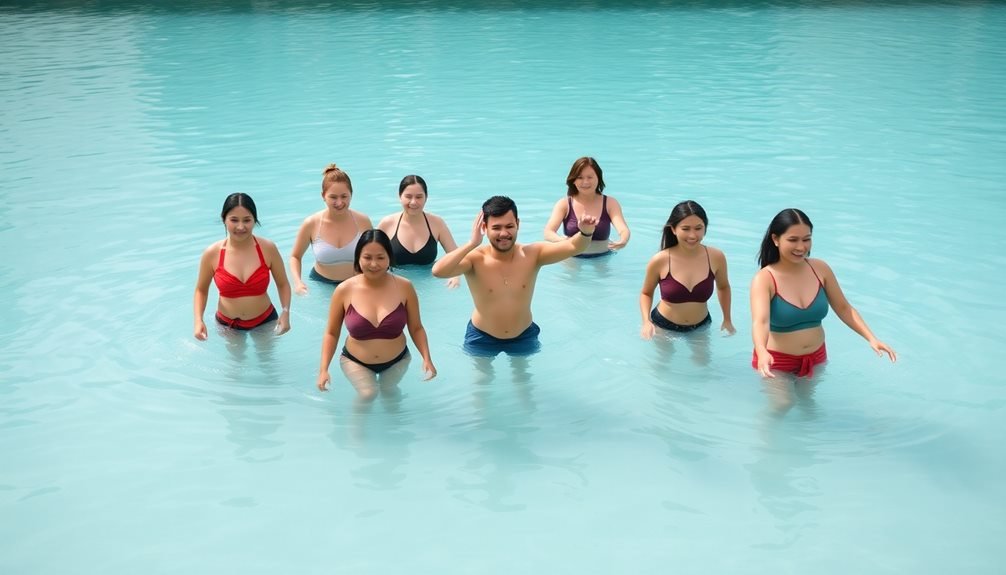
When you're first starting out, water walking groups provide an ideal low-pressure introduction to aquatic exercise. These small groups typically meet in the shallow end of the pool, where you'll walk forward, backward, and sideways while the water provides gentle resistance. You'll maintain control of your movements while staying at a comfortable depth where you can touch the pool bottom.
The instructor will guide you through basic walking patterns, helping you maintain proper posture and form. You'll learn to engage your core muscles while moving your arms through the water to enhance stability. Most classes incorporate simple variations like high-knee walking, side-stepping, and gentle jogging to gradually build your confidence.
Water walking groups often focus on social connection, allowing you to chat with others while exercising. You won't feel rushed or pressured to keep up with complex routines. The water's buoyancy reduces impact on your joints, while its hydrostatic pressure can help calm anxiety by creating a gentle, surrounding pressure on your body.
You'll typically start with 20-30 minute sessions, gradually increasing duration as your comfort level grows.
Shallow Pool Stretching Classes
Building upon water walking fundamentals, shallow pool stretching classes offer a natural progression for those seeking gentle mobility work. These classes take place in waist-deep water, where you'll experience reduced joint pressure while maintaining stability. The water's natural resistance helps support your body as you move through various stretching exercises.
You'll start with basic shoulder rolls and neck stretches before progressing to deeper stretches targeting your major muscle groups. The instructor will guide you through hamstring reaches, side bends, and gentle spinal twists – all modified for the aquatic environment. You don't need to worry about losing balance, as the water provides constant support.
The warm water temperature (typically 83-86°F) helps relax tense muscles, making stretching more effective and comfortable. You'll learn proper breathing techniques that complement each movement, helping reduce anxiety while improving flexibility.
Classes usually run 45 minutes, with options to modify stretches based on your comfort level. The small class size guarantees you'll receive personal attention and form corrections when needed. For maximum benefit, try to attend these classes twice weekly, allowing time for recovery between sessions.
Aqua Yoga Sessions
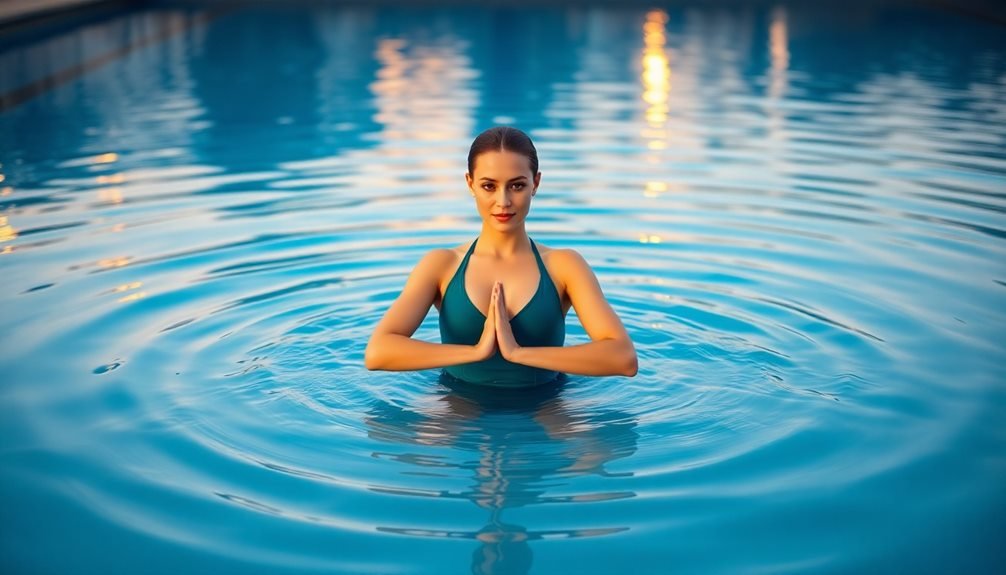
Aqua yoga sessions blend traditional yoga principles with the supportive properties of water. You'll find that water's natural buoyancy helps reduce joint pressure while providing gentle resistance for each movement. These classes typically last 45-60 minutes and don't require any prior yoga experience.
| Position | Benefits | Modifications |
|---|---|---|
| Mountain Pose | Improves balance, reduces anxiety | Keep shoulders submerged |
| Tree Pose | Enhances focus, strengthens core | Use pool wall for support |
| Warrior I | Builds leg strength, calms mind | Wider stance for stability |
| Triangle Pose | Stretches spine, releases tension | Float arms at surface |
| Sun Salutation | Increases energy, promotes flow | Slower shifts |
During your session, you'll practice controlled breathing techniques while moving through modified yoga poses. The water's temperature (typically 83-86°F) helps relax tense muscles and calm your nervous system. You can expect your instructor to demonstrate each pose from the pool deck, offering clear verbal cues and adaptations for different fitness levels. The combination of gentle movements, warm water, and mindful breathing creates an ideal environment for managing anxiety while building strength and flexibility.
Low-Impact Water Dancing
Through gentle movements and rhythmic patterns, low-impact water dancing offers a playful approach to aquatic exercise. You'll move to music while performing simple dance steps in chest-deep water, which naturally reduces impact on your joints while providing resistance. The buoyancy allows you to feel lighter and more graceful, helping ease anxiety about coordination or performance.
In a typical session, you'll start with basic steps like side-to-side movements and gentle turns. Your instructor will guide you through progressive combinations, including arm sweeps, leg lifts, and flowing changes. You won't need prior dance experience, and you can modify movements to match your comfort level.
The water's resistance helps strengthen your muscles while its pressure creates a calming, embrace-like sensation that can reduce stress. You'll practice at your own pace, focusing on fluid movements rather than complex choreography.
The class usually incorporates both upbeat and relaxing music, helping you stay energized while maintaining a peaceful state of mind. If you're feeling overwhelmed, you can always return to simple swaying movements until you're ready to rejoin the routine.
Floating Meditation Classes
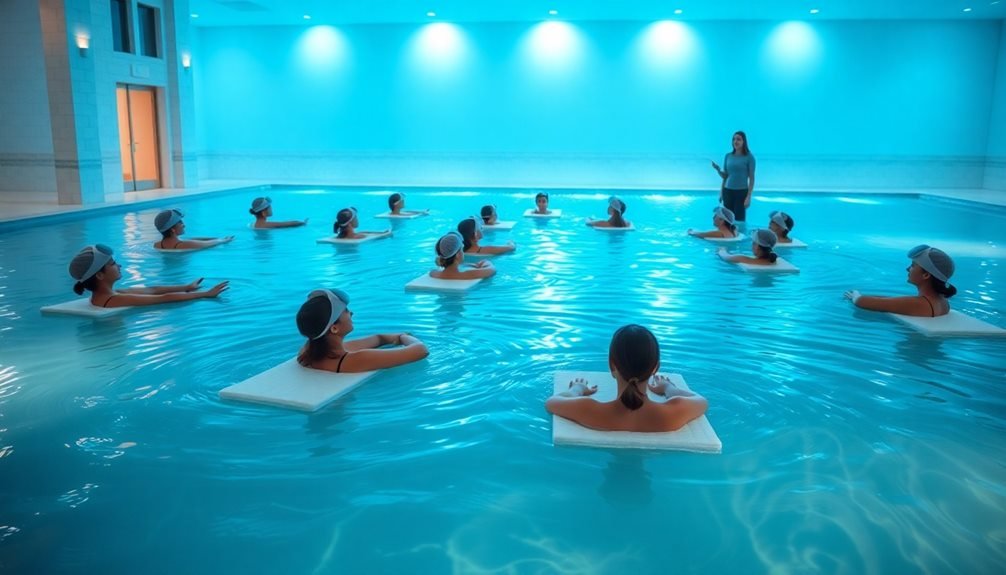
Along with gentle movement exercises, floating meditation classes combine mindfulness practices with the water's natural buoyancy.
You'll learn to use flotation devices like pool noodles or specialized meditation cushions while focusing on your breath and staying present in the moment. The water's temperature is kept slightly warmer than typical pools to help your muscles relax completely.
During these sessions, you'll practice different floating positions while your instructor guides you through visualization and breathing techniques.
You'll start with basic back floating, gradually progressing to more supported positions using pool equipment. The classes typically last 45 minutes, allowing enough time to settle into a meditative state without becoming overwhelmed.
You don't need any swimming experience to participate, as you'll always have support from both equipment and instructors.
The classes emphasize creating a judgment-free environment where you can work at your own pace. Many participants report reduced anxiety levels after just one session, citing the combination of water's natural calming properties and structured mindfulness exercises.
You'll also learn portable relaxation techniques that you can practice outside the pool to manage daily stress.
Frequently Asked Questions
Do I Need to Know How to Swim to Join Water Aerobics Classes?
You don't need to swim to join water aerobics classes. Most classes take place in shallow water where you can stand, and instructors provide flotation devices for deeper water exercises.
What Should I Wear if I'm Uncomfortable in Traditional Swimsuits?
You can wear swim shorts with a tankini top, swim leggings, or a modest swim dress. There's also swim shirts with built-in UV protection. Many sporting goods stores offer comfortable alternatives to traditional swimsuits.
Are There Private Sessions Available for Those With Social Anxiety?
You'll find many instructors offer one-on-one sessions to help you feel more comfortable. Contact local pools or aquatic centers to request private lessons, and don't hesitate to explain your needs for a personalized experience.
Will Chlorine Affect My Skin Medications or Anxiety Medications?
You'll need to check with your doctor about specific medications, as chlorine can interact with some skin treatments and medications. It's best to discuss your pool activities with your healthcare provider beforehand.
Can I Bring a Support Person to Help Me Feel Comfortable?
Yes, you'll find most facilities welcome support persons. They can sit poolside or join you in the water if they've paid for a class. Check with your instructor about specific policies beforehand.
In Summary
You'll find these water-based exercises offer a safe, nurturing environment to manage anxiety while improving your fitness. By starting with any of these beginner-friendly classes, you're taking an important step toward better physical and mental wellbeing. Don't hesitate to communicate your comfort level with instructors, and remember that you can always go at your own pace. The water's natural buoyancy and calming properties will support you every step of the way.

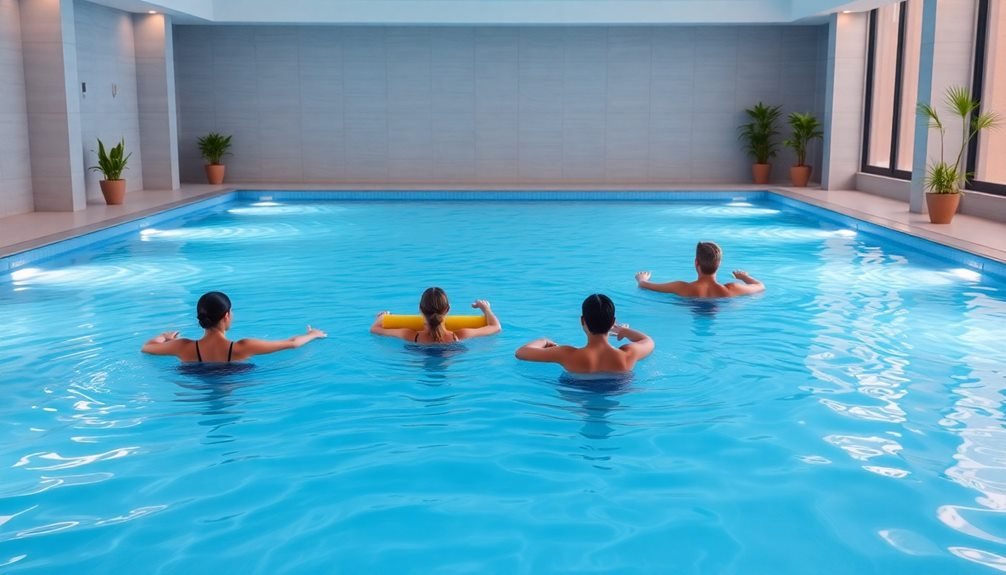
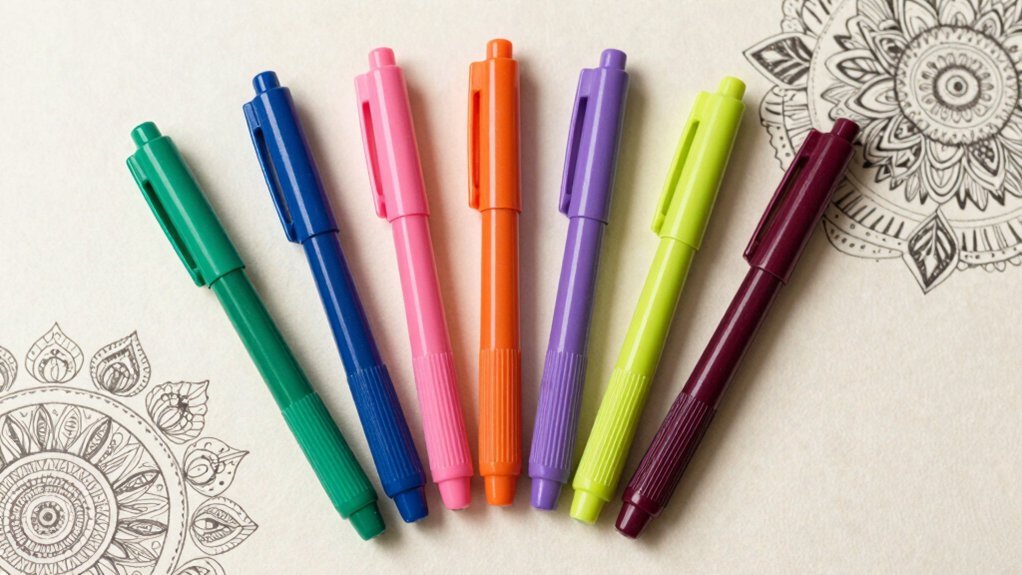

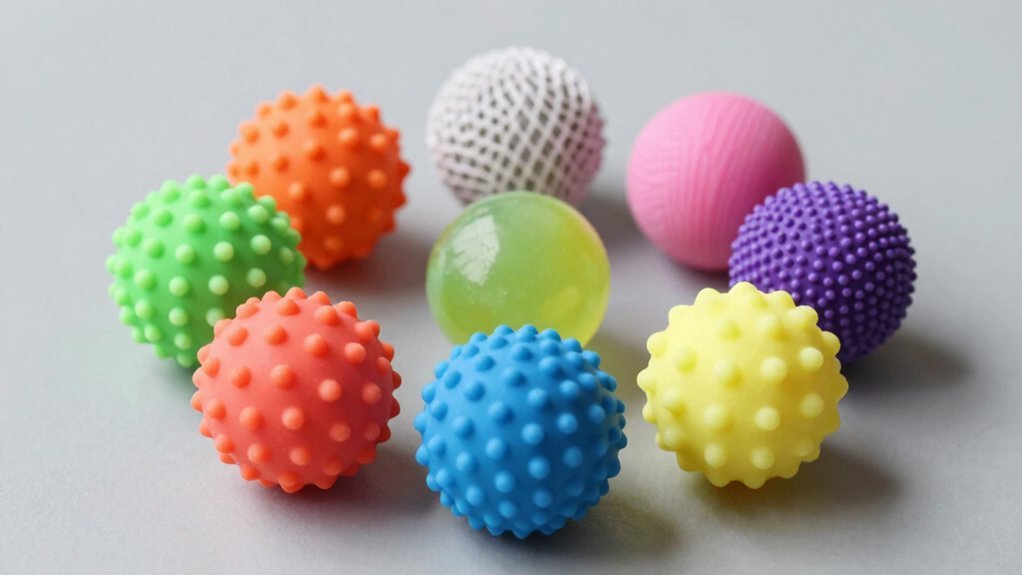
Leave a Reply